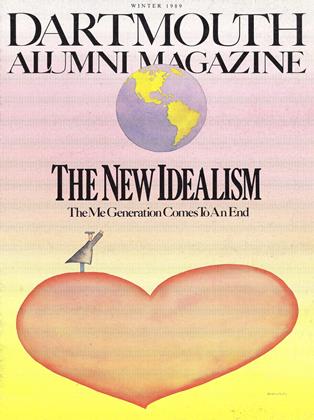Dartmouth's chief sponsor of student voluntarism is the Tucker Foundation, an organization founded in 1951 to "support and further the moral and spiritual work and influence of the College." So who was Tucker? He was arguably the best president Dartmouth has ever had. As the College's last theologian chief executive from 1893 to 1909, William Jewett Tucker restored the College's finances, quadrupled the number of students, oversaw the construction of 20 new buildings, and courted a relationship with alumni that has endured to the present. When Tucker died at the age of 87, The New York Times wrote, "Under him the institution of which Webster said, 'lt is a small college, but there are those who love it,' became a large college without diminished devotion."
Despite 14years of service as a Dartmouth trustee, he declined the first two offers of the presidency in 1876 in 1892 because of his commitments to the Madison Square Presbyterian Church and later the Andover Theological Seminary. When the Trustees offered him the position a third time in 1893, however, he accepted and became the ninth president of Dartmouth College.
Tucker took charge of 22 faculty members and fewer than 400 students in an environment where Greek and Latin were obligatory and Darwinism was scorned. He tapped the alumni as a source of strength, encouraging them to make Dartmouth their "intellectual residence" and to "keep young with the College rather than to grow old with the class."
The results were 12 new alumni associations—which doubled the number in existence—and an inflow of gifts that funded the new Dartmouth Hall, Webster Hall, the Fayerweather dormitories, Massachusetts Hall, and numerous other additions to the physical plant. He introduced a new admissions scheme to ensure geographical distribution; the percentage of students from outside of New England rose from 14 percent to 26 percent.
Tucker gave weekly talks on college life, character, and conduct. Some of his advice to nineteenthcentury undergraduates could be helpful to those of today: "Do not expect that you will make any lasting, or any very strong impression on the world through intellectual power without the use of an equal amount of conscience and heart."
The man who inspired the foundation, President William Jewett Tucker.
 View Full Issue
View Full Issue
More From This Issue
-
 Cover Story
Cover StoryBEYOND ME
December 1989 By Charles Wheelan ’88 -
 Feature
FeaturePutting Words in the Mouths of the Great
December 1989 By Charles Wheelan ’88 -
 Feature
FeatureBob Pack's Quantum Cat
December 1989 By Jay Heinrichs -
 Feature
FeatureSEASON'S GREENING
December 1989 -
 Article
ArticleDr. Wheelock's Journal
December 1989 -
 Sports
SportsThe College's First Fan Picks a Winner
December 1989 By Noel Perrin







